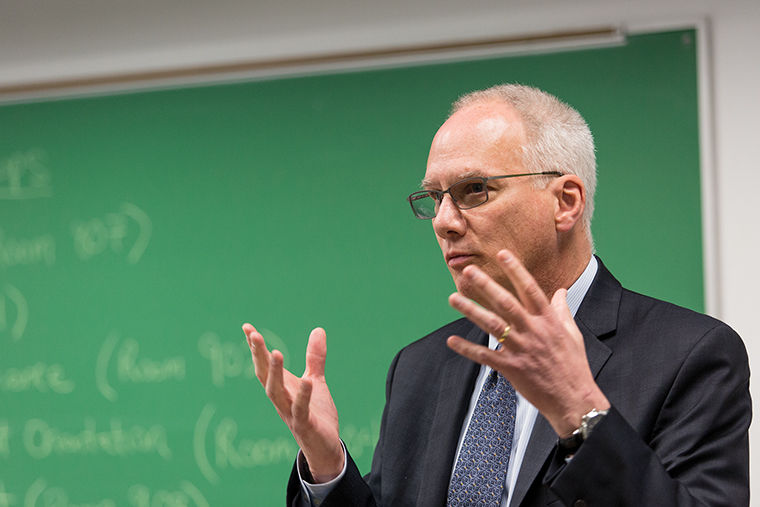Assembly recaps Strategic Plan Committee’s work
Senior Vice President and Provost Stan Wearden said the Strategic Plan’s implementation involves prioritizing and reassessing goals at the April 25 assembly at Collins Hall auditorium in the 624 S. Michigan Ave. Building.
May 2, 2016
Faculty, staff and administration convened April 25 at the Collins Hall auditorium in the 624 S. Michigan Ave. Building to update the college community on the progress of the Strategic Plan’s implementation and share feedback on the process.
At the meeting, titled “Are We Achieving Our Greatness?” Senior Vice President and Provost Stan Wearden said the plan’s implementation involves prioritizing areas of the college, working on them for the next five years, re-evaluating goals and creating new priorities for the following years.
“We all want to be on the same road,” Wearden said. “We all want to end up at the same destination five years from now, but the road can be broad.”
The Strategic Plan Implemen-tation committees, which include Universal Learning Outcomes; Columbia Core; Integrated First-Year Experience; Registration and New Student Orientation; and Community Engagement, along with the separate Diversity, Equity and Inclusion Committee broke into small groups to discuss the Strategic Plan’s progress, give feedback and address any concerns from faculty and staff.
Attendees could participate in a discussion with each Strategic Plan committee’s members.
Following the committee meetings, attendees reconvened for an update on each committee’s discussion and progress.
Pegeen Quinn, associate provost of Academy Personnel and chair of the Community Engagement Committee, said the members accomplished their two goals to define what qualifies as a community engagement activity and conduct a collegewide survey about these types of activities at the college.
Quinn said the committee will analyze its survey’s results to create a database and develop rubrics to evaluate community engagement at the college.
Steven Corey, interim dean of the School of Liberal Arts & Sciences and the chair of the Columbia Core Committee, said his committee has come up with essential courses consistent withthe ULO’s that are very similar to the current LAS courses but also include additional business and communication courses.
“The big question the Core Committee is dealing with now is how do students navigate through the core,” Corey said. “We have come up with an idea for a better term of pathways that students can follow.”
Corey said one of the ideas the committee has come up with to develop these pathways is to create classes that allow students to complete both their general requirements and a minor. He added that the committee has considered requiring the same number of credits for all majors to simplify the overall student experience.
Brian Marth, assistant provost of Academic Services and a member of the Integrated First-Year Experience Committee, said the committee has discovered that students define their college experience by their departments but struggle to identify with the general Columbia experience.
Marth also said the committee is not sure whether one class mimicking “First-Year Seminar” could integrate students to the Columbia experience. He added that the committee has discussed first-year mandatory advising, credit benchmarks and curricular requirements for freshmen.
Robin Whatley, associate professor in the Science & Mathematics Department, asked the IFYE committee if they had considered how to help students find their minors during their freshman year.
Suzanne Blum Malley, senior associate provost and chair of the IFYE Committee, said one of the main objectives of the curricular plan is to further engage students in their majors early on and to have major and minor combinations.
Andrew Whatley, assistant dean of the School of Liberal Arts & Sciences and committee member, said the Registration and New Student Orientation Committee created a first-year student package that would tell new students everything they need to know when they first arrive at the college, including which classes to take, where to live and how to pay for school.
Onye Ozuzu, dean of the School of Fine & Performing Arts and the chair of the Diversity, Equity and Inclusion Committee, said the members of the DEI Committee have addressed the question of defining diversity, equity and inclusion during meetings.
“There are some members of the committee that feel like it is very important that we define it on an institutional level, and there are some members of the committee that feel we should be at a point where we understand the urgency for action,” Ozuzu said.
Ozuzu added that the committee will continue to meet and ask other committees what the college would look like if diversity, equity and inclusion were thriving.
“[The Strategic Plan] is not an effort to change our [college] culture,” Wearden said. “It is an effort to keep the progress going and to keep us all moving in a collective common direction.”








